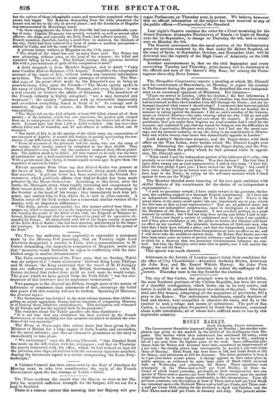The Shropshire Conservative reports a meeting at which Mr. Disraeli
met his constituents of Shrewsbury, on Monday, to report his conduct in Parliament during the past session. He described his own independ- ence as an occasional opponent of Ministers. For instance— ":Upon my arrival in London, [after his election,] the first information I received on entering the lobby of the House of Commons was, that Government
had determined to force the Canadian Corn Bill through the House ; and my in-
formant inquired what course I should adopt? I answered, that however painful it might be to my feelings to oppose the Ministers, I should not hesitate for a moment in voting against the measure. I did so ; and a member of the Govern- ment—a Cabinet Minister—the same evening, asked me why I did so, and said that the people of Shrewsbury did not care about the measure. It is possible, gentlemen, that you might have forgiven my tergiversation had I voted for the measure, and explained to you that my reason for doing so was the difficulties in which the Conservative Ministers were placed ; but I had not the moral cou- rage, nor the immoral audacity, to say one thing to my constituents in Shrews- bury and within twenty-four hours vote diametrically opposite in London."
Lord Ashley's Short-time measure, and the Sugar-duties with their effect on the West Indies, were battles which Mr. Disraeli fought over
again. Discussing the squabbles about the Sugar-duties, and the Pre- mier's change from the policy which he had pursued while in opposi- tion, Mr. Disraeli said- " What could I and the independent portion of his followers do 2—why, vote precisely as we voted three years before. Was that factious ? The first time I came down among you as your representative, I said in this room, 'I have ful- filled the first pledge I gave you; I have turned out the Whigs ' : but, could I have come before you as an honest man on the present occasion, and say, I have kept in the Tories, by voting for the self-same measure which I voted against to turn out the Whigs ? ' " The Member blended some vaunting of his own pure ambition with skilful flattery of his constituents for the choice of so independent a representative- " I seek no pecuniary reward ; I have ample reward in the generous, the ho- nest, the confiding support of a thorough English constituency. If I have not
an independent constituency, where am I to look for one ? Where is the
proud baron or the many-acred squire who can imperiously say to you, return me this man or that as your representative ? You are no political sham, but an honest and independent constituency, equal in intelligence to one-half of the Members of the House of Commons. I met you first, perhaps, in a great measure by accident ; but I had not long been among you before I said to my- self, 'I have now found a society of enlightened men in whom I can confide ; and if they place confidence in me, the smiles or frowns of a Minister will have no effect on my conduct.' The miserable insinuations of third-rate men, who hint that I have been refused a place, and that the independent course I have taken against the Ministry arises from disappointment, have no effect on me, and I will never take the trouble to answer them. Sir Robert Peel knows me—we have been some years on terms of private intimacy—and he knows me too well to think for a moment that any pecuniary circumstances influence my con- duct. Let him, the Minister, once state that in public, and I will answer the charge ; but not till then."
This speech was much cheered.


























 Previous page
Previous page